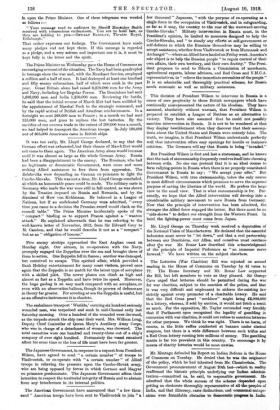It was too early, Mr. Lloyd George declared, to say
that the German effort was exhausted, but their chance of March 21st would not come to them again. The American Army alone would increase until it was almost as large as the whole German Army. Russia had been a disappointment to the enemy. The Russians, who had no legitimate or democratic Government, were more and more seeking Allied assistance to free them from oppression. The Bolsheviks were depending on German ex-prisoners to fight. the Czecho-Slovaks. This was not a time, Mr. Lloyd George concluded, at which an honourable peace could be made. The military caste in Germany who made the war were still in full control, as was shown by the Treaties imposed on Russia and Rumania, and by the dismissal of Herr von Kuh]mann. He believed in a League of Nations, but if an undefeated Germany were admitted, "every time you came to a decision the Prussian sword would clank on the council table." The Prime Minister incidentally spoke of the " compact " binding us to support France against a "wanton attack." He explained afterwards that he was referring to the well-known letter of November, 1912, from Sir Edward Grey to M. Cambon, and that he would describe it not as a " tompact " but as an " obligation of honour."


































 Previous page
Previous page